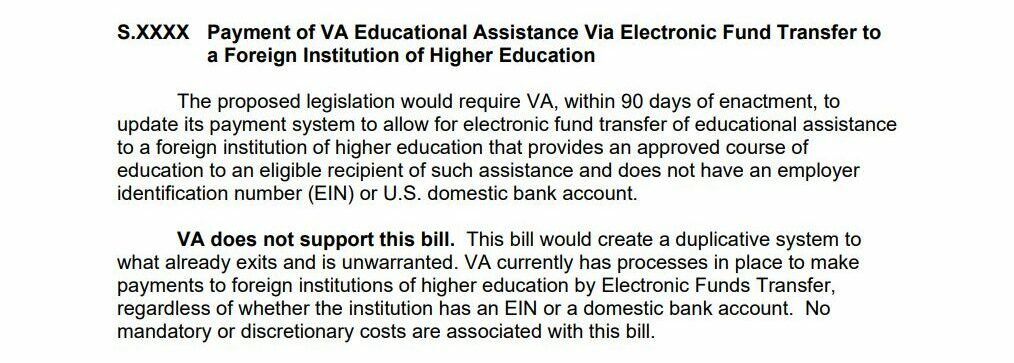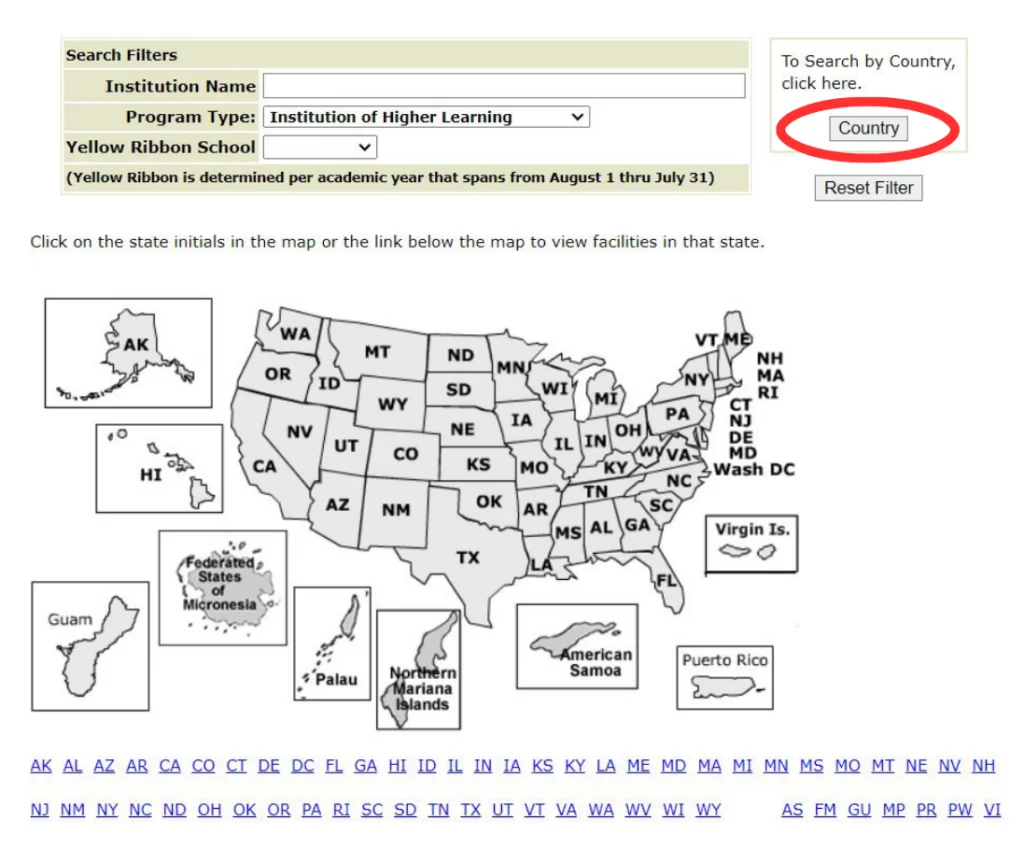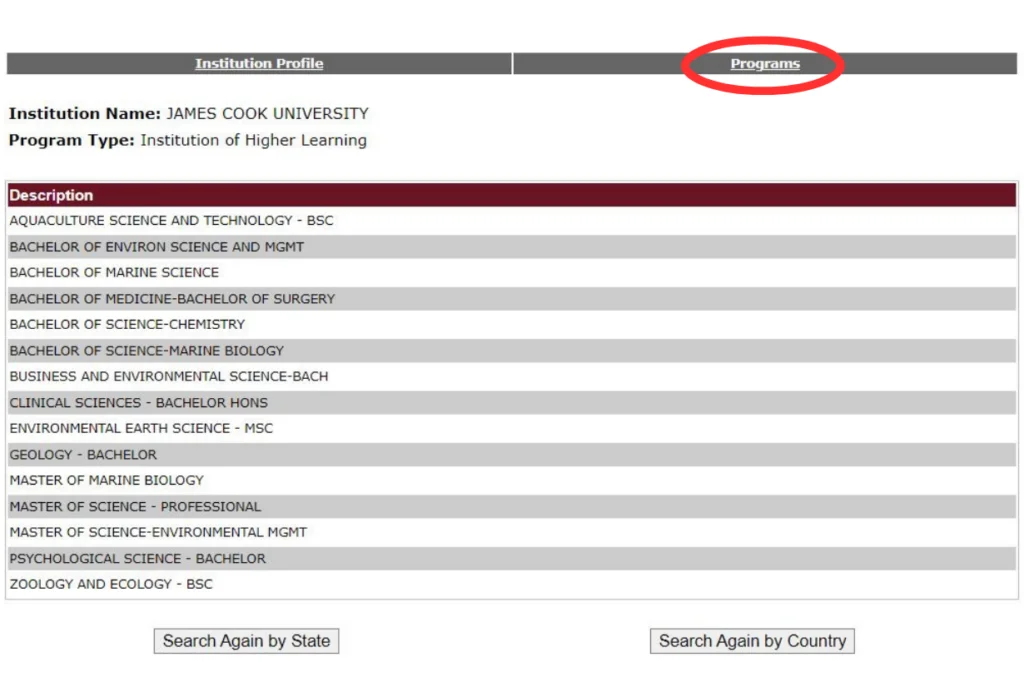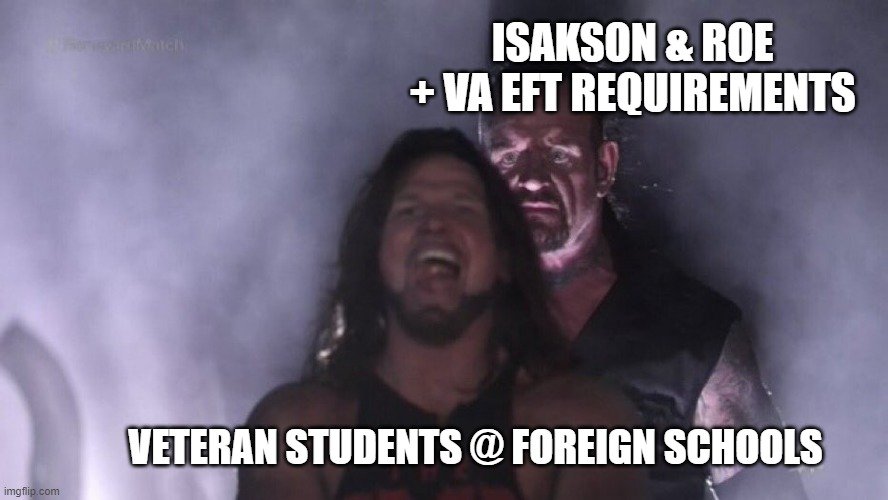Using the GI Bill at a Foreign School
Views from beautiful Phuket, Thailand.
October 3, 2023
WHAT YOU NEED TO KNOW
Alright, this is a long overdue article that many of you have been asking for. I’m sorry it took so long, life has been pretty busy and this article was a pretty dense, so thanks for your patience. The intent of this piece is to help people understand exactly what’s happened regarding VA education funding and foreign universities and how you should proceed if you’re interested. A lot of this information is now available on the VA website, but I’ve just tried to consolidate everything here with a some of the context and background you probably won’t be able to find online.
Just to be clear upfront: What I’m going to explain below may be discouraging and could negatively impact your plans to seek an educational experience overseas. Bottom line, recent developments in 2021 have made it much more difficult (impossible for some) to attend an international school. But, literally while I was in the process of writing this article, there have been additional developments that are very encouraging. For some, this process will still be an absolute pain in the ass. Just get mentally prepared, understand there’s a good change that this won’t be easy, so most importantly: START EARLY.
This article will explain what we know, the background on why this happened, and practical advice for how you can use VA funding at a foreign university.
I’m going to give you a bit of context from my personal experience and also include bits and pieces of information I’ve been able to gather from other current and prospective veteran students. I’ve also done additional research through conversations with different foreign university finance offices, VA representatives, and my congressman’s office. I’ve used “GI Bill” in the title, but the information outlined here applies to all VA education funding, and also applies to VR&E.
This whole thing has been–at least for me–very complicated and confusing, so prepare yourself: This is going to be a long article. I want to try to cover all of the important details, and if you’re seriously considering pursuing this, understanding these details will matter. A lot of students have been forced to navigate this all on their own with little to no support, so understanding all of these details and knowing where to find information will be important.
Obviously, I don’t work for the VA and I’m not currently at a foreign school (I gave up on it), so feel free to use this article as a guide, but still do your own research and verify everything with official sources. (I’ve included some at the bottom of this article)
Finally, before we launch into the article: If you’ve gone through this process yourself and have information that you think would be helpful for people, please let me know. If you notice that there’s inaccurate information in this article, I’ve misrepresented something, or there’s been a new development that’s not reflected here, just send me an email. I’d like this article to serve as one of the resources out there for those who need it and I’ll do my best to keep it updated. So if there’s anything contained in this article that’s inaccurate, that wasn’t my intention. Thanks for understanding.
BACKGROUND
Let me back up to December of 2021 after I’d been accepted to a university in Australia for graduate school. Going abroad to use veteran education benefits had been my plan for some time, and I was excited that everything was finally coming to fruition. Although the majority of people aren’t necessarily interested in doing something like this, I figured that there were a decent amount, so I’d document the process and share it with people. The “process” didn’t end up lasting very long for me as it only took a few weeks for everything to come to a screeching halt.
I learned that in June of 2021, section 1018 of the Isakson and Roe Act took effect. According to the VA website, this new legislation “enhances and expands education benefits and programs for Veterans, Service members, families, and survivors.” The Isakson and Roe Veterans Health Care and Benefits Improvement Act of 2020 is 134 pages long, and reading through some of it, there seems to be a lot of positive changes, and most have nothing to do with foreign universities. One of the objectives is to limit the negative impact of predatory, for-profit universities that target members of the military who have access to Tuition Assistance, GI Bill, VR&E, or other funding, using them as cash cows. So as an example, this law enforces additional limitations on certain sales or advertising practices and commissioned-based recruiting for universities.
Unfortunately, there are also multiple requirements in this legislation that jeopardized many foreign universities’ eligibility to participate. This is because there are now additional, increasingly strict requirements of academic institutions in this legislation that make it very difficult for foreign schools to comply. Back in 2021, I learned my university needed to provide very specific financial information that’s predicated upon fluctuating exchange rates. They were asked to maintain a policy guaranteeing “enrolled members of the US Armed Forces to be readmitted if such members are temporarily unavailable or must suspend enrollment for reason of service/deployment in the Armed Forces.” In the case of Australia, doing so would’ve resulted in a breach of domestic Australian discrimination laws. There was also a privacy law issue where the VA was asking all foreign schools to provide non-VA student data under a “record inspection rule” which would violate Australian privacy laws. These are a few of the problematic rules foreign schools were being asked to comply with.
I searched all over the internet trying to understand what was going on.
Of course the VA GI Bill help line was zero help and I saw people posting on Reddit and Facebook about their experiences. Fortunately for me, I hadn’t started school yet. Some people were in more complicated situations where they had partially completed their program at a foreign university and the VA education funding was halted mid-program. Some people were taking loans or paying out of pocket and some would eventually have to drop out of their program. And then there are others I know of at foreign schools who have literally heard nothing of all of this and it’s been business as usual. So if that’s you, don’t ask questions or jinx it and just keep doing what you’re doing.
What I also learned more recently, from a veteran currently studying overseas, is that some of these complications go all the way back to 2016, where there was an issue with paper checks and electronic funds transfers (EFTs). Bureaucracy would have it that some of these foreign schools didn’t have a bank account that could accept EFTs so the VA sent paper checks. Then there were schools that were unable to cash the paper checks, which made some veterans have to pay out out of pocket. And for whatever reason, when paperwork problems like this happen, it seems to literally take an act of Congress to resolve the issue (spoiler alert).
Something else that has exacerbated all of this is the closure of the Foreign School Approval Department and their responsibilities were taken over by the Federal and State Approvals team. The knowledge and expertise of the Foreign School unfortunately is no longer available and there is no longer a department specifically devoted to helping veterans trying to use VA education benefits overseas.
Isakson and Roe Requirements
Below are some (not all) of the requirements under section 1018 of the Isakson and Roe Act that have made it difficult for foreign educational institutions. Literally, foreign universities I contacted were telling me that they were in the process of deciding if they should continue to accept VA funding because these requirements had become so burdensome.
- Providing beneficiaries (veteran students) with a financial aid shopping sheet with loan information, graduation rates, employment rates, etc. Predicated upon exchange rates, which fluctuate daily, impossible requirement.
- Providing beneficiaries with information on the type and amount of federal financial aid not administered by VA, and financial aid offered by the institution that the individuals may qualify to receive. Doesn’t make sense to require foreign schools to provide US students with information about US federal financial aid.
- Providing beneficiaries with an estimate of student loan debt the individuals would have upon graduation. Based on exchange rates, which fluctuate daily.
- Providing a listing of conditions or additional requirements, including training, experience, or examinations, required to obtain the license, certification, or approval for which the course of education is designed to provide preparation. Requirements for licensing and certification in the US are often different than in other countries, so it would be the responsibility of the beneficiary to understand this.
- Providing records of non-GI Bill students for examination by VA for compliance purposes. Violates privacy laws in many countries. Why should a foreign school be giving data on their country’s students to the US Dept of Veterans Affairs?
- Maintain a policy guaranteeing “enrolled members of the US Armed Forces to be readmitted if such members are temporarily unavailable or must suspend enrollment for reason of service/deployment in the Armed Forces.” In the case of Australia, doing so would’ve resulted in a breach of domestic Australian discrimination laws. And think about it, why should another country’s university give special treatment to US military veterans? Just kind of a weird request.
BOTTOM LINE: These new requirements caused quite a bit of chaos for foreign universities and veteran students. There was a lot of confusion, panic, and heated back-and-forth between foreign universities, students, and the VA.
It was very difficult for students to get clear answers so they could make important decisions about their education and financial situation, especially with time constraints related to deadlines for visa or university applications. This was about the time I decided that I ain’t got time for this drama since I was trying to start school soon and I didn’t feel like getting yanked around for an indefinite period of time.
Timeline
- January 2021: The President signed the Johnny Isakson and David P. Roe, M.D. Veterans Health Care and Benefits Improvement Act of 2020 (P.L.116-315) into law.
- May 2021: Until May 2021, foreign schools requested program approval by submitting the two-page Application for Approval of a Program in a Foreign Country (VA Form 22-0976) and a description of the program for which approval was requested. While preparing for implementation of legislation passed in 2020 that altered longstanding approval limitations/requirements applicable to foreign programs, VA Education Service became aware of the inadequacy of the long-used, extremely abbreviated application process and immediately changed the application process to one which addressed the entirety of applicable statutory/regulatory approval conditions. Since relevant laws and regulations do not distinguish requirements for new program approvals and continuing program approval, this discovery marked a dramatic shift to the standards foreign schools were held to for VA education participation. As I understand, this is where the requirement for a US based bank account or Employer Identification Number (EIN) entered the equation, independent from the new Isakson and Roe requirements. It just so happened these two separate efforts were happening around the same time.
- June 2021: Section 1018 of the Isakson and Roe Act takes effect.
- August 2021: Section 1018 of the Isakson and Roe Act officially enforced on academic institutions. Adds requirements for schools to provide students with certain financial information and other requirements. Schools must comply with the requirements in order to qualify to receive VA education funding.
- December 2021: The President signed the Responsible Education Mitigating Options and Technical Extensions (REMOTE) Act. Section 3, has the following impact on foreign schools: Foreign schools are not required to provide education records of non-VA beneficiaries to VA for examination. (38 U.S.C. § 3690(c)(2)) Foreign schools are not required to provide a financial aid shopping sheet to VA. (38 U.S.C. § 3679(f)). All other program approval limitations and requirements specified in 38 C.F.R. § 21.4253, 38 C.F.R. § 21.4254, 38 C.F.R. § 21.4255, 38 C.F.R. § 21.4260, 38 C.F.R. § 21.4265, 38 C.F.R. § 21.4266 and 31 C.F.R. § 208.3 still apply to foreign schools. This is according to an email from a VA representative. You can go read the REMOTE Act yourself at link included above. Ctrl + f “foreign” and you’ll find where the relevant information is. It’s not easy to read or understand, but feel free to go have a look.
- May 2022: H.R.7375 – To direct the Secretary of Veterans Affairs to update the payment system of the Department of Veterans Affairs to allow for electronic fund transfer of educational assistance, administered by the Secretary, to a foreign institution of higher education passes through the House and died in the Senate. This was because the VA promised SVAC that changes would be made (which never occurred) without further legislation. A new version of H.R. 7375 was supposed to be introduced this year, but that has yet to happen. Had the bill passed the Senate, in conjunction with the REMOTE Act, the problem might have been solved in 2022. A group of veterans had calls with over 30 political offices to push for this legislation.
- June 2022: Changes made by the REMOTE Act go into effect on June 15, 2022 and applies to educational institutions beginning August 1, 2022.
- April 2023: S.1090 – A bill to direct the Secretary of Veterans Affairs to update the payment system of the Department of Veterans Affairs to allow for electronic fund transfer of educational assistance, administered by the Secretary, to a foreign institution of higher education, and for other purposes is introduced in the Senate. As of now, it looks like it’s gone nowhere, unfortunately. But you can read about it here.
- April 2023: VA Testimony from Joseph Garcia to the U.S. Senate. Looks like it was maybe in response to S.1090, which is described above. Documents the VA’s claim that there are no problems with electronic funds transfers (EFT) to the foreign bank accounts held by these international universities because the VA already “has processes in place…regardless of whether the institution has an EIN or domestic bank account.” This means at some point (not sure when), the VA reconsidered its requirement for foreign universities to maintain a US based bank account and is now allowing EFTs to foreign bank accounts held by universities. This is very good news, because this was a requirement that many foreign schools would’ve simply been unable to comply with. Whether these foreign universities have actually been able to receive tuition payments since this changed, I don’t know. If anyone has any experience to confirm this, I’m interested to hear about it. Figure from the Senate testimony is below.

- June 2023: VA requirements for electronic funds transfer (EFT) for foreign schools are officially amended. Instead of a US based bank being a mandatory requirement, it is now only preferred. Foreign universities that have a bank account in the non-US country are now able accept payment via EFT from the US Department of Veterans Affairs. This is a big deal as this was the most difficult remaining roadblock in all of this. However, according to veteran students that are currently in the middle of this, this memo has made no positive impact on people’s situations (I would love for someone to tell me I’m wrong here, so let me know if that’s the case). This memo was published after many schools had already left the GI Bill program. Schools and School Certifying Officials (SCOs) who remained were not notified of the memo, so no one knew about it. When veterans did share the memo with schools (who had left the VA program), they didn’t believe it. People have been so yanked around by the VA that they are now skeptical of anything the VA says and wanted to see an actual legislative act. Schools were concerned that the memo was insincere or that the policy could change overnight.
BOTTOM LINE: Isakson and Roe resulted in a number of new requirements that most foreign schools struggled to comply with. Simultaneously, the VA realized their current method of paying for foreign school tuition was outdated and out of compliance with regulations, resulting in a new requirement for foreign universities to have an EIN or US based bank account. That was a particularly problematic requirement for many foreign universities as many couldn’t legally obtain a US bank account.
The VA passed the REMOTE Act, exempting foreign institutions from certain Isakson and Roe requirements. And then the VA decided to allow foreign institutions to use their foreign bank accounts after all. Obviously this is good news, but it’s just ironic…. after months and months of financial turmoil, drained savings, and debt for some veteran students. And at the end of the day, it still looks like this isn’t completely resolved and people are still having problems. Proceed with caution and get in touch with potential schools as soon as possible.
Implications
So what does this mean for you? First, I think there is now (after all of the very recent updates in 2023) a good chance that you will be able to attend a foreign university if that’s what you want to do. Students in the 2021 – 2023 timeframe really just got unlucky timing with all of this. At the moment, it looks as though all of these challenges are at least on their way towards being resolved.
The Isakson and Roe Act requirements that immediately disqualified foreign schools have been lifted via the REMOTE Act and foreign bank accounts are now permitted for tuition EFTs. However, a remaining change is that the application process for foreign university program approvals is much more involved than it was before. The VA has published information online to help students navigate this.
Something very important to remember is that the VA does not approve schools. The VA approves individual programs. This means that if you plan on attending Oxford, it doesn’t matter that your buddy went and did a master’s at Oxford two years ago and used the GI Bill. That has absolutely nothing to do with your individual program at Oxford and does not mean your program at Oxford is also approved or that it will get approved. Even if your friend did the same program you intend to do, there’s a good chance you may have to apply to get the program re-approved.
So yes–that means, literally, every individual associate’s, bachelor’s, and master’s program at each foreign school must be approved if a veteran wants to attend that program. If your specific program isn’t approved, you’ll have to work with your university and they have to submit the request for the approval. The student can’t submit the approval request, although they will likely be very involved working with the university during the process. And everything is backlogged, so there are delays. According to a conversation with an admissions office I had in April 2023, they said program approvals are taking 8-12 months. Things may be moving more quickly now, but be prepared to have some patience. So the earlier you start, the more likely your dream will become a reality. The VA has shared all of the requirements necessary to get a foreign program approved on their website.
If you want to study at a foreign institution, begin identifying universities early on that have programs you’re interested in. Check the VA’s Web Enabled Approval Management System (WEAMS) and you can search by country by clicking on the circled button in the image below.

After you search for and locate your university, you need to check for your specific program. So make sure you click on the “programs” tab on the right as you can see circled in the image below.

Because I don’t trust government websites to be updated or accurate, I would also go to the university website and get in touch with the office that handles finances, student fees, and/or VA funding. Start a conversation with them to find out if they are still accepting VA funded students and if your program of interest is already approved by the VA. If your program is not already approved, see if they have any idea of what the program approval waiting period might be so you can start trying to plan out your timeline. Find out who exactly you should be working with to submit the program approval request and get their contact information so you can be sure to get updates directly from them. Be persistent and recognize it’s your responsibility to follow up and keep the process moving. Additionally, I would consider multiple universities so you have options if one falls through.
Another foreign school admissions office informed me that they generally advise US military veteran students to “use other funding, such as a federal loan, to cover the financial declaration and expenses early on in their course, and then use VA funding to repay the loan” after students finally receive their program approval from the VA.
ABSOLUTELY DO NOT DO THIS!
(How much do you trust the government?)
You have to ask yourself if you are ok with having to pay those loans off yourself. If the answer is yes, then go for it. If you’re counting on VA education funding to bail you out, you risk putting yourself in a terrible situation. There are students I personally know who now have thousands of dollars of student loans that they took on based on the assumption that things would eventually get sorted out with the VA and they’d receive their GI Bill payments. Things did not get sorted out and they did not receive their GI Bill payments. And now many of them are dealing with serious financial implications that will impact them for years.

The bottom line is, none of us anticipated the huge bureaucratic nightmare that was coming our way when Isakson and Roe passed. And no one expected the VA to randomly come out with new EFT (electronic funds transfer) requirements for foreign schools with (at least from what I saw) zero grace period for current students, and no real way to get support. The rug can get pulled out from under you with no notice.
2021 – 2023 has been pretty stressful for any of the veteran students impacted by this and some have been given the absolute runaround by the VA, causing a lot of frustration for everyone involved. I won’t bother going into details because it’s just too much, but I’ve seen some pretty aggravating email chains and heard some disappointing stories. For me personally, I did lose some personal funds that I used to cover enrollment fees for my Australian university while I waited for the VA issues to get resolved. Which, they never did. At least not until now. I’d already moved on and I’m in a master’s program in Hawai’i, so it all worked out for the best, and I’m very thankful to be using VR&E aka Veteran Readiness and Employment (formerly knows as Voc Rehab).
But just remember, at the end of the day, you are the only one who ultimately cares about your individual education, career, and life. It’s your responsibility to figure out how to navigate this. Yes, people will be there to help you, but you will likely have to take a lot of initiative and generally a very active role in this process. Hopefully as more time goes on, the process will become more efficient and a bit easier.
There are many veterans out there who have been working at this for years now, both for themselves and for the people coming after them. It’s taken phone calls, meetings, and a lot of work for H.R. 7375 to get off the ground, and there is still work to be done, as shared in this interview with one veteran who is dealing with these challenges.
Some final thoughts
I know this was a super long article, but I genuinely hope it helps. As much as I’m sure it’s a lot to read, it was a lot for me to put together. One thing I want to mention is that multiple students have told me that while the VA has made improvements with the REMOTE Act and allowing foreign bank accounts for EFTs, these actions have not resolved all of the roadblocks they’re experiencing. Some are still paying out-of-pocket for their education. So just beware that you may still face complications and it may ultimately not work out for you. As one veteran PhD student put it, “The VA has permanently burned bridges with many foreign schools, as many do not intend to return to the GI Bill program,” regardless of if the EFT issues have been fixed. They had a horrible experience and don’t want to deal with it anymore.
So if you hit any of these roadblocks, I would suggest looking into additional study abroad options other than direct enrollment in a foreign school. This document I received from a VA representative lays out some potential alternatives for you. Also, please consider calling your congressional representatives to use your voice to push our politicians to act.
A random, somewhat related piece of information that’s good to know: The military housing allowance (MHA) that you receive with VA education funding is NOT paid when school is not in session, i.e. Christmas, spring break, summer (unless you’re taking summer courses). So make sure you factor that into your budget. My homie @sunny_actual shared that with me. You’re welcome.

Alright for real, good luck with everything! I’ve included a consolidated list of resources all linked below. Thanks for reading.
resources
- Web Enabled Approval Management System (WEAMS) – Official VA website.
- Foreign Program Approval Information for STUDENTS – Official VA website.
- Foreign Program Approval Information for SCHOOLS – Official VA website.
- Foreign School Program Approval Application Package Information – Official VA website.
- Study Abroad Options – Sourced from an email attachment from a VA Education Liaison Representative from the Federal & State Approvals Team.
- VA Email POC for Foreign School Questions – federal.approvals@va.gov.
- Information about the REMOTE Act – Official VA website.
- Actual REMOTE Act – US Congress website.
